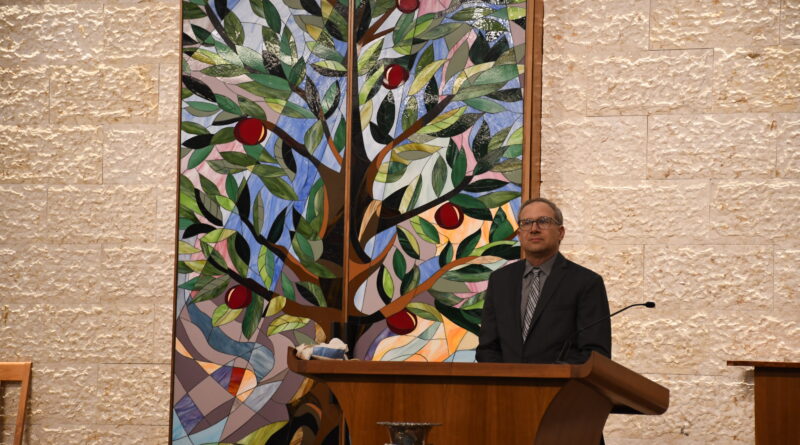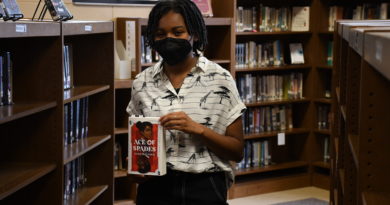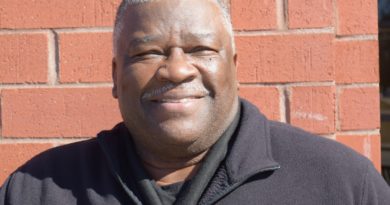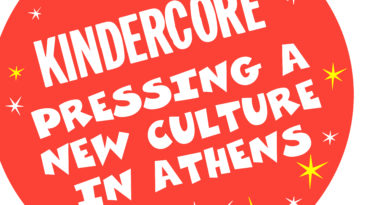A Jewish perspective: Q&A with Rabbi Eric Linder
Eric Linder is the current Rabbi at the Congregation Children of Israel (CCI) in Athens, Georgia. Prior to becoming their Rabbi in 2012, Linder worked as a program director for Hillel at the University of Georgia. Born in Plantation, Florida, Linder fell in love with Judaism shortly after joining his local temple’s youth group. He later attended Rabbinical school at Hebrew Union College in Cincinnati, and two years later, New York. While in school, he also spent a year in Israel before starting his career as a Rabbi at Temple Israel in Omaha, Nebraska. BluePrints Web Editor Alyssa Weiszer sat down with Linder to discuss the current Israel-Hamas conflict.
Q: What are your thoughts on the social media coverage of this conflict?
A: I think the problem is you can’t really get into a conversation. You can post an article and you can post a viewpoint, but if you’re really interested in trying to change someone’s opinion, I think the only way to do that is to have a conversation. Ask someone to have coffee, or have a phone call. That being said, I think there is a plus to social media. For me, one of the things that I really use it for is for articles that I wouldn’t otherwise see. You have to actively seek out other voices. I listened to a podcast that suggested some things to listen to or read from a Palestinian perspective, and I’m trying to do that. I do think that when the short snippets, I call them the bumper stickers, say all these things, they’re not very helpful. I’m guilty of it, but I think ultimately we have to move onto real conversations with people.
Q: How has this conflict affected everyday operations within the synagogue?
A: About five years ago there was that horrible shooting in Pittsburgh. That is when the synagogue started having a guard at the temple. Since Oct. 7, we still have a guard at the temple, but I would say our expectations of what that guard does have expanded. Everybody’s level of comfort in terms of opening the door for strangers is on everyone’s mind. It’s a tough thing because something that’s very true about our congregation is that we want to be welcoming. We want people to come in that aren’t Jewish and want to experience a Jewish service or are friends of a member. It’s this tension between wanting to be secure, but also wanting to be as welcoming as possible.
Q: How long did you live in Israel? What was your experience with the people and society?
A: The first year of Rabbinical school in the Reform Movement (a denomination of Judaism) is spent in Israel. It’s one year in Israel and then four years at one of the state campuses. The experience was eye-opening. For one, it was my first time actually out of the country. I was really struck. The Israeli people have lived with a lot of hardship with terrorist threats and bombs, and yet they still live with this real sense of hope and joy in their lives. It’s really something to behold.
Q: How do you think this war has affected Jewish-Americans across the country?
A: I think for Jews that have lived and grown up in America, Israel is always in their minds and hearts to some degree. That doesn’t mean that we necessarily love the Israeli government or support what they’re doing. Similar to America, I would like to think that those of us who are American citizens love America, even though there are some things that the government does that we abhor. I think that for those of us who want a sense of peace for the Middle East, which I would like to think is most of us, this is a real tragedy and our hearts break for everyone whose lives are affected.
Q: As a Rabbi, what are your thoughts on the war in its current stage?
A: First of all, not every Rabbi necessarily feels the same way, just like how not every Jew does about this conflict. I do think it’s fair to say that for every Rabbi, their job is to help their community deal with it. In some ways, that is a different kind of challenge. One thing that has come up a lot in our community is the word ‘alone.’ People are feeling alone. People in organizations that we have partnered with in the past for social causes, like Black Lives Matter or LGBTQ+ issues, people that we really felt an allyship with, now we feel like that’s not the case, and that’s really hard. In terms of the war itself, in the short term, I don’t see a solution that is good for anybody, and that is heartbreaking. Then, now over 100 days in, there are more than 100 innocent Israelis that are still being held hostage. There are a lot of painful pieces to this, including the death of many Palestinians. That is also incredibly painful and heartbreaking.
Q: How has this war impacted the Athens community, whether that be protests, rallies or events?
A: There’s definitely been some negative and positive things that have happened. There was a local business that posted something about being in solidarity with the Palestinian people and #ReadPalestine. That hashtag was created after the war started. Some of the books that were listed there were seen by many, myself included, as problematic. But, by all means, people who identify as Palestinian deserve an identity and, just like we have Jewish book month, there could and should be such a thing (for Palestinians). But, this was made as a knee-jerk reaction to this war without any mention of the tragedy happening in Israel. Things like that and protests that say, ‘Free Palestine to the river and the sea,’ which means Israel feel like, ‘Are you calling for the genocide of Israel?’ Because that’s what that phrase means. On the other hand, there has been an amazing outpouring of love and support. In front of our social hall doors, there are probably about 100 post-its that were made in the shape of a heart. They have notes of support from non-Jewish members of the Athens community. I think they did something similar for a mosque too which is wonderful. It is not either-or, and I think that is part of the problem. People are seen as either ‘pro-Israel’ or ‘pro-Palestine,’ as opposed to ‘pro-human rights’ and ‘pro-peace.’





